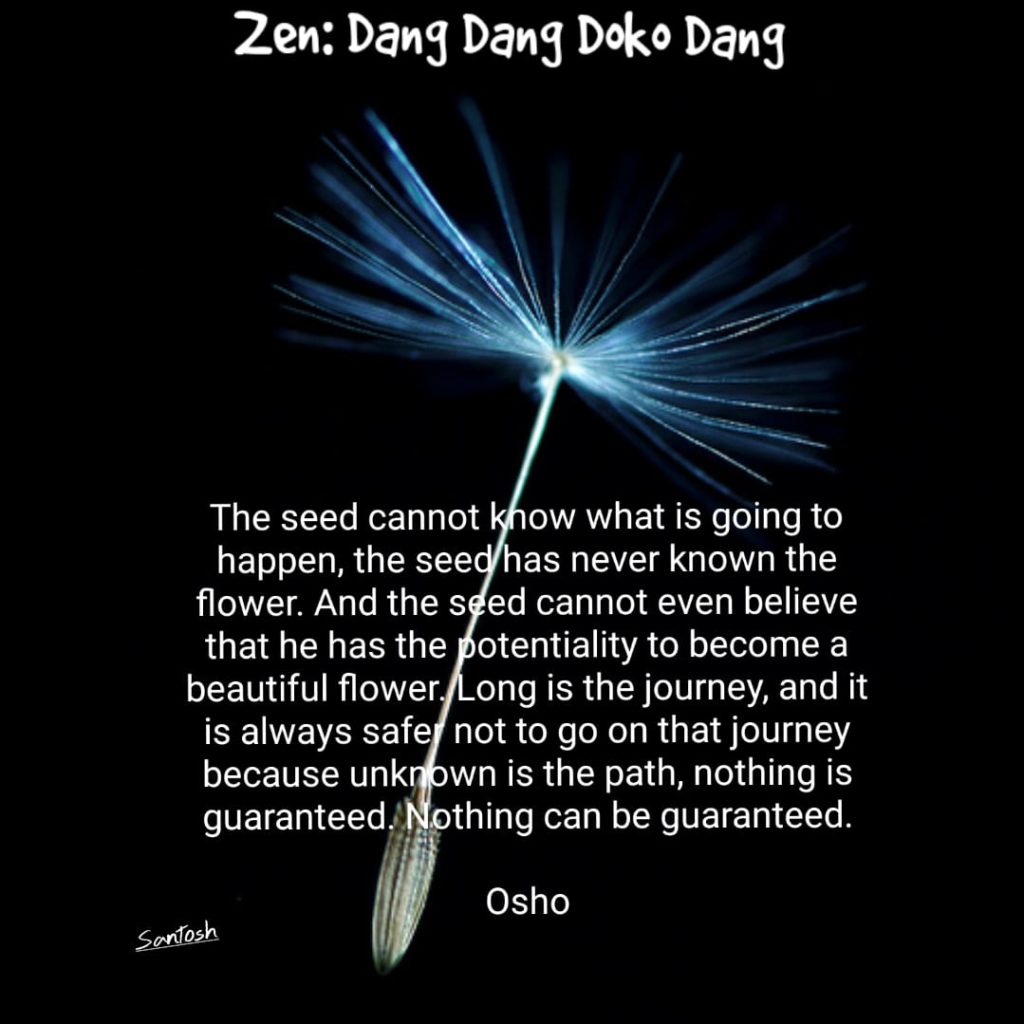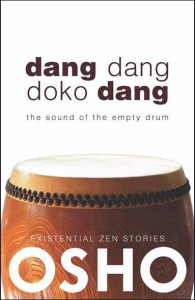
Osho’s Vision on Zen
Osho sees Zen not as a historical spiritual tradition, but as the future of a humanity that has matured to the point that people no longer need religions controlled by “priesthoods” and based on fearful superstitions that cripple people’s innate intelligence and divide them from one another. This book offers a deeper understanding of the underlying differences between Eastern and Western approaches to religion and the nature of consciousness.
A Rebirth in the Trust in Life
It’s a beautiful introduction to a world where each individual has the capacity for an instant and profound understanding of existence, and a rebirth of the trust in life that each of us are born with. Dang Dang Doko Dang represents the sound of the drum beaten by a Zen master in an existential lesson for a disciple. As well as symbolizing the poetic quality of Zen, the title represents the special flavor of this collection of Osho’s commentaries on well-known Zen stories. This volume is part of the OSHO Classics series and also includes Osho’s responses to questions about the meditation technique of Zazen.
The Sound of the Empty Drum
 Dang Dang Doko Dang ….de klank van de drums
Dang Dang Doko Dang ….de klank van de drums
Wie wordt er niet geraakt door de klank van de drums? Het zou ’t meest oorspronkelijke geluid zijn, dat herinnert aan de tijd in de baarmoeder. “Dang Dang Doko Dang” geeft het geluid weer dat een Zen meester laat horen bij wijze van les aan zijn discipel, rechtstreeks gelinkt aan ’t Bestaan. Bekende en minder bekende Zen verhalen worden in dit boek met poëzie en humor van commentaar voorzien.
Het boek Dang Dang Doko Dang is verkrijgbaar via de Nederlandse Boekhandel.
Osho Over Zen
Dit boek biedt een dieper inzicht in de onderliggende verschillen tussen Oosterse en Westerse benaderingen van religie en in de aard van het bewustzijn.
Het is een mooie introductie tot een wereld waarin elk individu het vermogen heeft voor een direct en diepgaand begrip van het bestaan en een wedergeboorte van het vertrouwen in het leven waarmee ieder van ons geboren wordt. Dang Dang Doko Dang vertegenwoordigt het geluid van de trommel waarop door een zenmeester geslagen wordt terwijl hij een existentiële les geeft aan een discipel. De titel symboliseert niet alleen de poëtische kwaliteit van Zen, maar ook de speciale sfeer van deze verzameling van Osho’s commentaren op bekende Zen-verhalen.
Osho About Zen
Osho sees Zen not as a historical spiritual tradition, but as the future of a humanity that has matured to the point that people no longer need religions controlled by “priesthoods” and based on fearful superstitions that  cripple people’s innate intelligence and divide them from one another. This book offers a deeper understanding of the underlying differences between Eastern and Western approaches to religion and the nature of consciousness. It’s a beautiful introduction to a world where each individual has the capacity for an instant and profound understanding of existence, and a rebirth of the trust in life that each of us are born with. Dang Dang Doko Dang represents the sound of the drum beaten by a Zen master in an existential lesson for a disciple. As well as symbolizing the poetic quality of Zen, the title represents the special flavor of this collection of Osho’s commentaries on well-known Zen stories. This volume is part of the OSHO Classics series and also includes Osho’s responses to questions about the meditation technique of Zazen.
cripple people’s innate intelligence and divide them from one another. This book offers a deeper understanding of the underlying differences between Eastern and Western approaches to religion and the nature of consciousness. It’s a beautiful introduction to a world where each individual has the capacity for an instant and profound understanding of existence, and a rebirth of the trust in life that each of us are born with. Dang Dang Doko Dang represents the sound of the drum beaten by a Zen master in an existential lesson for a disciple. As well as symbolizing the poetic quality of Zen, the title represents the special flavor of this collection of Osho’s commentaries on well-known Zen stories. This volume is part of the OSHO Classics series and also includes Osho’s responses to questions about the meditation technique of Zazen.
Fragment uit Dang Dang Doko Dang
De volgende vraag wordt gesteld: Als de andere oever precies als deze oever is, wat is dan de noodzaak van Verlichting?
Osho’s antwoord luidt: “Deze vragen met ‘wanneer’ en ‘als’ zijn heel slim. Je leidt niemand anders om de tuin dan jezelf. Luister opnieuw naar de vraag. Dit is juist waar Verlichting over gaat. Als je te weten bent gekomen dat dit moment Alles is en de plek waar je je bevindt het Geheel is en dat deze wereld de andere wereld is, heb je ‘het bereikt’, ben je bevrijd. Want als er geen andere wereld is, kan er geen verlangen meer zijn. Als dit moment alles is, gaan alle verlangens stoppen.” Osho
Clever Questions to Osho
“These questions with ‘when’ and ‘if’ are very cunning questions. And you are not deceiving anybody else, you are deceiving yourself. Listen to the question again.
If you have come to know that the other bank is this very bank then you have already become enlightened, there is no need. This is what enlightenment is all about. If you have come to know that this moment is all and the place that you are in is the whole, and that this world is the other world — you have attained, you are liberated. Because if there is no other world there can be no desire. If this moment is all, all desire ceases.” Osho
Impressie van Dang Dang Doko Dang
“Het zaad kan niet weten wat er gaat gebeuren, het zaad heeft nooit de bloem gezien. En het zaad kan niet eens geloven dat het de mogelijkheid heeft een prachtige bloem te worden. De reis is lang en het is altijd veiliger niet aan die reis te beginnen, want het pad is onbekend, er zijn geen garanties. Er kunnen geen garanties zijn. De reis kent duizend-en-een  gevaren, vele valkuilen – en het zaad is veilig, het zit verscholen in een harde kern. Maar het zaad doet zijn best, het spant zich in; het laat de harde schil los die voor zijn veiligheid zorgt, het komt in beweging. Meteen begint de strijd: het gevecht met de grond, met de stenen, met de rotsen. En het zaad was heel hard en het plantje is heel zacht, er dreigen vele gevaren.
gevaren, vele valkuilen – en het zaad is veilig, het zit verscholen in een harde kern. Maar het zaad doet zijn best, het spant zich in; het laat de harde schil los die voor zijn veiligheid zorgt, het komt in beweging. Meteen begint de strijd: het gevecht met de grond, met de stenen, met de rotsen. En het zaad was heel hard en het plantje is heel zacht, er dreigen vele gevaren.
Het zaad liep geen gevaar, het zaad had duizenden jaren kunnen overleven, maar het jonge plantje staat bloot aan allerlei gevaren. Toch gaat het plantje op weg naar het onbekende, naar de zon, naar de bron van het licht; het weet niet waarheen of waarom. Het te dragen kruis is zwaar, maar het zaad is bezeten van een droom en komt in beweging.
Het pad voor de mens is hetzelfde. Het is moeilijk begaanbaar. Er is veel moed voor nodig.” Osho
The Sound of the Drum
Dang Dang Doko Dang represents the sound of the drum beaten by a Zen master in an existential lesson for a disciple. As well as symbolizing the poetic quality of Zen, the title represents the special flavor of this collection of Osho’s commentaries on well-known Zen stories. “Zen is a way of dissolving philosophical problems, not of solving them,” he explains. “It is a way of getting rid of philosophy, because philosophy is a sort of neurosis.” The volume also includes Osho’s answers to questions about the meditation technique of Zazen.
Impression of Dang Dang Doko Dang
“Truth is always new and mind is always old. That&’s why mind and truth never meet. Mind is always of the past, truth is always of the present. That’s why mind and truth never meet. Mind is that which you have already known; truth is that which is yet to be known. Mind is the known and truth is the unknowable or the unknown. Mind is just a record of all that has happened. Mind is not an adventure; truth is an adventure.
“There is an old proverb which says, ‘There is nothing new under the sun.’ If you think about the mind the proverb is true. But if you think about truth, the proverb is absolutely false. Then there is another proverb – which is true – which says, ‘There is nothing old under the sun.’ Everything is absolutely fresh and new – like a fresh leaf coming out of the tree. Truth is always young, mind is always old. That’s why Jesus says to his disciples, ‘Unless you become like small children, you will not be able to enter into my Kingdom of God.’
“Mind is very cunning and clever, but not intelligent. Intelligence is a quality of awareness and cunningness and cleverness are just substitutes for intelligence. So mind goes on playing tricks of cleverness; and in that cleverness, mind itself is caught. In its own cleverness and cunningness it is lost. Remember this – that you will not become intelligent by being clever, you will become intelligent by being more aware. Cleverness need not be necessarily a sign of intelligence. Even stupid people can be clever. Cleverness comes out of experience: you do things many times, you learn. The mind becomes like a computer – each experience is fed into it and it goes on learning and accumulating knowledge and it goes on using that knowledge.
“Intelligence has a totally different quality: it has nothing to do with experience, it has something to do with awareness. Cunningness comes out of experience; intelligence comes out of awareness. That’s why old people become very cunning… and hippies are right when they say never believe a person who is more than thirty. Because by that time a person becomes cunning, one has learned the tricks and the ways of the world.
“But a child is intelligent because a child is more alert, more radiantly alert. See a child watching something. If a child is watching a snail just watch the child – how alert, how totally in the moment he is. It is as if he has become just the eyes; his whole being is pouring through the eyes. A child is intelligent, an old man becomes cunning and clever. A child has no experience so he cannot use the past. He has to face the present.
“And the whole Zen attitude is that you will have to become a child again; you will have to attain a second childhood in which you drop all experiences. Mind is nothing but a name for the whole accumulated past. Mind is not an entity really, just a piled-up past. If you disperse it, if the dust of the past is cleaned away from the mirror of your being, you will become intelligent. And only intelligence can know what truth is.” Osho